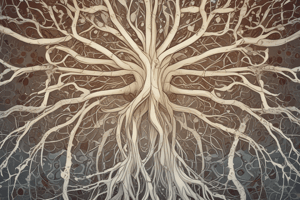Podcast
Questions and Answers
What term did William James use to describe the fluid and constantly changing nature of consciousness?
What term did William James use to describe the fluid and constantly changing nature of consciousness?
- Current of thought
- Flow of awareness
- Flux of perception
- Stream of consciousness (correct)
Which psychological perspective emphasizes the idea that the whole is greater than the sum of its parts?
Which psychological perspective emphasizes the idea that the whole is greater than the sum of its parts?
- Psychoanalysis
- Functionalism
- Gestalt psychology (correct)
- Cognitive psychology
Which psychological approach focuses on unconscious desires and conflicts influencing behavior?
Which psychological approach focuses on unconscious desires and conflicts influencing behavior?
- Psychobiology
- Humanistic psychology
- Psychoanalysis (correct)
- Cognitive psychology
What aspect does humanistic psychology emphasize in its approach to understanding human nature?
What aspect does humanistic psychology emphasize in its approach to understanding human nature?
Which area of psychology studies how mental processes impact problem-solving and language development?
Which area of psychology studies how mental processes impact problem-solving and language development?
What does psychobiology primarily focus on in the study of behavior?
What does psychobiology primarily focus on in the study of behavior?
What is a key characteristic of functionalist psychology in its research methods?
What is a key characteristic of functionalist psychology in its research methods?
Which of the following concepts is NOT typically associated with humanistic psychology?
Which of the following concepts is NOT typically associated with humanistic psychology?
What is the primary focus of structuralism in psychology?
What is the primary focus of structuralism in psychology?
Who is credited with establishing the first psychology laboratory?
Who is credited with establishing the first psychology laboratory?
Which philosopher is associated with the idea of mind-body dualism?
Which philosopher is associated with the idea of mind-body dualism?
What does the philosophy of 'tabula rasa' propose about human learning?
What does the philosophy of 'tabula rasa' propose about human learning?
Functionalism arose as a reaction to which psychological school of thought?
Functionalism arose as a reaction to which psychological school of thought?
What key principle defines functionalism in psychology?
What key principle defines functionalism in psychology?
Which of the following best describes the level of analysis known as 'the person'?
Which of the following best describes the level of analysis known as 'the person'?
What did Francis Bacon contribute to the field of psychology?
What did Francis Bacon contribute to the field of psychology?
Flashcards
Levels of Analysis
Levels of Analysis
Three perspectives: the brain, the person, and the group used in psychology.
The Brain
The Brain
Focuses on brain structure and activity variations across individuals and situations.
The Person
The Person
How individual mental processes affect behavior.
The Group
The Group
Signup and view all the flashcards
Francis Bacon
Francis Bacon
Signup and view all the flashcards
Mind-Body Dualism
Mind-Body Dualism
Signup and view all the flashcards
Structuralism
Structuralism
Signup and view all the flashcards
Functionalism
Functionalism
Signup and view all the flashcards
Stream of Consciousness
Stream of Consciousness
Signup and view all the flashcards
Gestalt Psychology
Gestalt Psychology
Signup and view all the flashcards
Psychoanalysis
Psychoanalysis
Signup and view all the flashcards
Humanistic Psychology
Humanistic Psychology
Signup and view all the flashcards
Cognitive Psychology
Cognitive Psychology
Signup and view all the flashcards
Psychobiology
Psychobiology
Signup and view all the flashcards
Neuroscience
Neuroscience
Signup and view all the flashcards
Study Notes
Levels of Analysis in Psychology
- There are 3 levels of analysis: the level of the brain, the level of the individual, and the level of the group.
- The brain level examines how brain structure and activity differ between individuals in various situations.
- The individual level explores how mental processes shape behavior.
- The group level explores how social and cultural factors influence behavior.
Key Figures and Schools of Thought
- Francis Bacon: Creator and popularizer of the scientific method. Emphasized data collection and analysis in research.
- René Descartes: Developed mind-body dualism, the idea that the mind and body are separate entities.
- John Locke: Proposed the concept of "tabula rasa," suggesting that the human mind is a blank slate at birth, shaped entirely by experience.
- Wilhelm Wundt: Considered the "father of experimental psychology." Established the first psychology laboratory. Focused on consciousness through experimentation. Developed voluntarism and structuralism.
- Edward Titchener: Expanded on Wundt's work, further developing structuralism. Emphasized introspection as a method for studying the basic elements of consciousness.
- William James: Developed functionalism, a school of thought emphasizing how mental processes adapt to the environment. Advocated for the study of the "stream of consciousness." Believed consciousness served a crucial function.
- Gestalt psychologists: Emphasized that perception is more than the sum of its parts. The whole is greater than the sum of its parts (holism).
- Sigmund Freud: Founder of psychoanalysis, which views behavior as driven by unconscious desires and conflicts. Developed a therapy approach, psychoanalysis.
- Humanistic psychologists: Emphasized the positive potential of humans, focusing on free will, consciousness, and individual experience.
Key Concepts
- Introspection: Careful self-observation of one's thoughts and feelings.
- Structuralism: A school of thought focusing on the basic structures of the mind, using introspection as a method.
- Functionalism: A school of thought focusing on the adaptive functions of the mind. Focuses on how mental processes enable humans to adapt to their environment and solve problems
Psychology and Neuroscience
- Psychobiology/Neuroscience: The study of how the brain's structure and function relates to behavior.
- Values of Psychology: The field uses theories (theory driven), research (empirical), and considers multiple perspectives (multi-level).
- It also acknowledges contextual influences in its perspective and methodology (contextual).
Studying That Suits You
Use AI to generate personalized quizzes and flashcards to suit your learning preferences.



